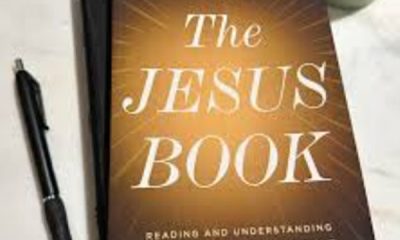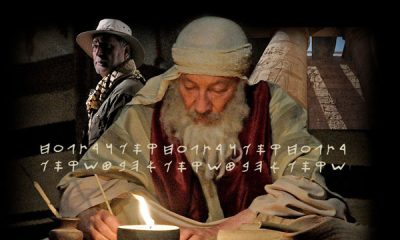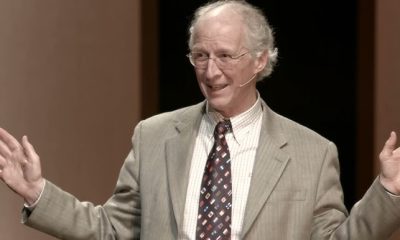Articles
God is always at work for us and for our good

Psalm 18 is a psalm of David, a song celebrating “the day when the Lord rescued him from the hand of all his enemies, and from the hand of Saul.” This psalm, the longest of Book One, praises God for His deliverance. It is also recorded, with slight differences, in 2 Samuel 22. At the center of this psalm is a strong confession of faith: “With the merciful you show yourself merciful” (Ps. 18:25).
This psalm begins (vv. 1–6) and ends (vv. 46–50) with praise offered to God. It is praise filled with love and thanksgiving for God’s protection from enemies and from death. The praise rejoices in the victories God has given His king and His people — victories displayed before the world.
The central section of the psalm (vv. 20–29) celebrates the faithfulness of David and of God. David served the Lord with integrity (we will look at the difficulties that seem to surround this kind of claim below). The Lord on His part had always been reliable and blessed His king. On each side of this central meditation on faithfulness we have the record of God’s powerful help for David (vv. 7–19; 30–45). Each of these two sections has its own character. Verses 7–19 emphasize the work of God to save David. Verses 30–45 highlight David’s success as God worked through him.
In light of this overview of the psalm’s structure, we want to look more closely at several points. First, how can David claim to be blameless (vv. 20–24)? The claim of blamelessness is a recurring theme in the Psalms. It is stated with special force in Psalm 26:
Vindicate me, O Lord, for I have walked in my integrity, and I have trusted in the LORD without wavering. Prove me, O Lord, and try me; test my heart and my mind. For your steadfast love is before my eyes, and I walk in your faithfulness. I do not sit with men of falsehood, nor do I consort with hypocrites” (Ps. 26:1–4).
But David is a murderer and an adulterer, to name only some of his sins. How can he claim to be blameless?
We need to recognize that David was a devoted and persevering follower of the Lord even though he did fall into very serious sin. When Nathan confronted him with his sins, he repented and grieved deeply for them. He expressed his repentance in beautiful psalms of penitence such as Psalms 32 and 51. His life as a whole was characterized by his faithful keeping of God’s covenant in obedience and repentance.
What David pleads, then, is not absolute moral perfection. He recognized that by such a standard he would never stand: “Enter not into judgment with your servant, for no one living is righteous before you” (Ps. 143:2). Rather, he pleads his faithfulness in comparison to the wickedness of those who hate God and His king. He makes this comparison not to claim that he deserves or has earned God’s favor, but to show that God’s saving grace has really made him different from the wicked in the ways in which he thinks, believes, and lives. David loves the Lord and His law, so his sin is grievous to him and he willingly repents and seeks to lead a godly life. In contrast, the wicked despise God and His holy law. They ignore God and seek in every way to harm their neighbor.
Again, David is not claiming that his perfect righteousness earns him God’s favor. Rather, he says God has brought him into His covenant and given him the integrity that he has. It is “God who equipped me with strength and made my way blameless” (Ps. 18:32). He belongs to God and follows God and therefore knows that God will be kind to him. It is not the self-righteous whom the Lord saves, but the humble: “For you save a humble people, but the haughty eyes you bring down” (Ps. 18:27). All his strength comes from the Lord (v. 1) and the faith or trust of the psalmist always turns to the Lord for help (Ps. 18:2; cf. Ps. 26:1: “I have trusted in the LORD without wavering”). The foundation of God’s care for David is not David’s deserving, but the Lord’s election: “He rescued me, because he delighted in me” (Ps. 18:19).
While David wrote this psalm and had every right to sing it in his faithfulness, once again we see the psalm drawing our minds beyond David to one greater and purer than David. This psalm belongs more to the Christ, who was fully blameless in every way, than to David. Paul demonstrates this in his use of this psalm in Romans 15:8–9. He writes:
For I tell you that Christ became a servant to the circumcised to show God’s truthfulness, in order to confirm the promises given to the patriarchs, and in order that the Gentiles might glorify God for his mercy. As it is written, “Therefore I will praise you among the Gentiles, and sing to your name” (Rom. 15:8–9).
In citing Psalm 18:49, Paul shows that it speaks of Jesus at least as much as it does of David. Indeed, even David can claim covenantal integrity only as he is in Christ.
Another feature of this psalm is the vivid picture of God’s coming to David’s rescue (vv. 7–15). David cried out for help (v. 6) and the Lord answered. “He bowed the heavens and came down; thick darkness was under his feet. He rode on a cherub and flew; he came swiftly on the wings of the wind” (Ps. 18:9–10). The fury of the Lord shook the earth (vv. 7, 15) and thunder and lightning preceded him (vv. 12–14). Hot smoke poured forth from his nostrils and fire from his mouth (vv. 8, 15).
Here is a marvelous picture of the power and determination of God to save. But when in David’s life did this happen? As we scan Old Testament history, we can find no such episode. Something like this happened when the Lord met with Israel at Mount Sinai, but nothing close to it happened in David’s experience.
The explanation is, of course, that David is speaking poetically here. He records not what he saw with his physical eyes, but what his eyes of faith saw happen. Although this awesome power of God usually remains hidden from view, it is absolutely real, and it is exercised for the well-being of His people. God is always working powerfully and passionately for His people even when we do not see it. David’s poetic imagery shows us more than eyes can see.
This truth is taught over and over again in the Bible. We need to have it taught repeatedly because we are so inclined to think that only the visible is real. Think of the experience of Elisha. He sat in Dothan apparently defenseless against the strength of the king of Aram. When his servant panicked, Elisha replied, “Do not be afraid, for those who are with us are more than those who are with them” (2 Kings 6:16). And then to comfort his servant further, Elisha prayed and God did an amazing thing. “Then Elisha prayed and said, ‘O Lord, please open his eyes that he may see.’ So the Lord opened the eyes of the young man, and he saw, and behold, the mountain was full of horses and chariots of fire all around Elisha” (2 Kings 6:17).
Elisha had never been in any danger, for the Lord was on his side.
We see something similar when the authorities came to arrest Jesus in the garden of Gethsemane. Jesus appeared weak and defenseless. Peter, in a panic, tried to protect Him with a sword.
Then Jesus said to him, “Put your sword back into its place. For all who take the sword will perish by the sword. Do you think that I cannot appeal to my Father, and he will at once send me more than twelve legions of angels?” (Matt. 26:52–53)
Jesus submitted to arrest not because He was helpless, but because He accepted the Father’s will for His death and our redemption.
This psalm reminds all of us that God is always at work for us and for our good. In the New Testament, the Apostle John makes the same point: “He who is in you is greater than he who is in the world” (1 John 4:4).
We do not need to fear, for God will save us in His good time. We should praise God for His mercy and help as this psalm does.
Sources:Christian Post
Articles
ബന്ധങ്ങളിലെ ബന്ധനങ്ങൾ (Article)
Articles
ക്രൈസ്തവ വിശ്വാസത്തിലെ യുക്തിയുടെ ആധാരം ക്രിസ്തുവിൻ്റെ പുനഃരുത്ഥാനം
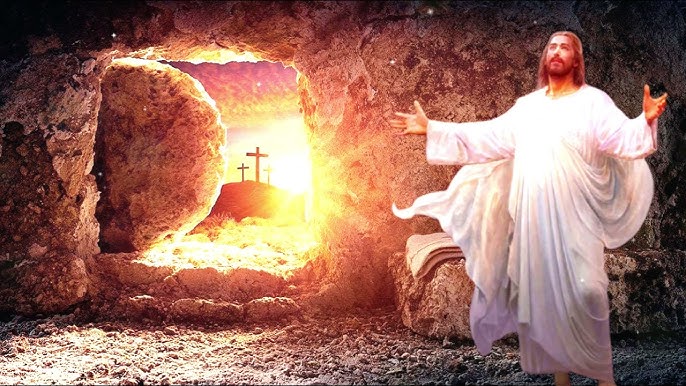
ശാസ്ത്രത്തിന്റെ അടിസ്ഥാനം തെളിവുകളും തത്വചിന്തയുടെ അടിസ്ഥാനം യുക്തിയും മതത്തിന്റെ അടിസ്ഥാനം അന്ധവിശ്വാസവുമാണെന്ന ധാരണയാണ് ലോകത്തിൽ പരക്കെ വ്യാപിച്ചിട്ടുള്ളത്. മതവിശ്വാസിക്കു തെളിവുകളോ യുക്തിയോ ചരിത്രബോധമോ ആവശ്യമില്ല എന്ന് ഏതാണ്ട് എല്ലാ മതവിശ്വാസികളും ഒരുപോലെ കരുതുന്നു. “എല്ലാം ഒരു വിശ്വാസമല്ലേ…” എന്നൊരു യുക്തി മാത്രമേ മതവിശ്വാസത്തിൽ പ്രായോഗികമായിട്ടുള്ളൂ എന്നാണ് യുക്തിവാദികളും സ്വതന്ത്രചിന്തകരും കരുതുന്നത്. അതിനാൽ മതമെന്നതു യുക്തിരഹിതമായ കെട്ടുകഥകൾ മാത്രമാണെന്ന പ്രചാരണമാണ് ഇവർ നടത്തുന്നത്. ഇതിൻ്റെ ഫലമായി മതവിശ്വാസത്തിന് യാതൊരു പ്രസക്തിയുമില്ലെന്ന ചിന്ത ഇന്ന് സമൂഹത്തിലെങ്ങും വ്യാപകമായിക്കൊണ്ടിരിക്കുന്നു.
കേരളത്തിലെ പ്രമുഖ സാംസ്കാരിക നായകനും എഴുത്തുകാരനും പ്രഭാഷകനുമായ ശ്രീ എം.എന്. കാരശ്ശേരി ഫെയ്സ് ബുക്കില് കുറിച്ചു, “ഭക്തിയും യുക്തിയും ഒരുമിച്ചുപോകാന് പ്രയാസമാണ്”. മറ്റൊരു പോസ്റ്റില് അദ്ദേഹം പറയുന്നു: ”യുക്തിയുടെ മതം എന്നൊന്നില്ല, എല്ലാം ഭക്തിയുടെ മതങ്ങളാണ്” എന്ന്. ഈശ്വര വിശ്വാസത്തെ സംബന്ധിച്ച് ഈയൊരു പൊതുബോധമാണ് ഇപ്പോള് എവിടെയും കാണാൻ കഴിയുന്നത്. സമൂഹത്തെ സ്വാധീനിക്കാന് കഴിയുന്ന ഒരു സാംസ്കാരിക പ്രവര്ത്തകന് എന്ന നിലയില് കാരശേരി മാഷിൻ്റെ ഈ അഭിപ്രായം എല്ലാ നിലയിലുള്ള വ്യക്തികളെയും മാറിച്ചിന്തിക്കാന് പ്രേരിപ്പിക്കും എന്നതില് സംശയമില്ല. അതിനാല് ക്രൈസ്തവ വിശ്വാസത്തിന് ആധാരമായിരിക്കുന്നത് യുക്തിരഹിതമായ ഭക്തിയാണോ യുക്തിഭദ്രമായ ഭക്തിയാണോഎന്നാണ് ഇവിടെ പരിശോധിക്കുന്നത്.
🟥1. ശാസ്ത്രത്തിന്റെ അടിസ്ഥാനം തെളിവുകളാണ് എന്നു പറയുംപോലെ ക്രൈസ്തവ വിശ്വാസത്തിന്റെയും അടിസ്ഥാനം തെളിവുകളാല് ഉറപ്പിക്കപ്പെടേണ്ടതാണ് എന്ന നിര്ബന്ധമാണ് ബൈബിള് മുന്നോട്ടുവയ്ക്കുന്നത്. ക്രൈസ്തവ വിശ്വാസത്തിലെ യുക്തിയുടെയും ഭക്തിയുടെയും അടിസ്ഥാനം യേശുക്രിസ്തുവിന്റെ പുനഃരുത്ഥാനമാണ്. വിശ്വാസത്തിനു മതിയായ തെളിവായി യേശുക്രിസ്തുവിന്റെ പുനഃരുത്ഥാനത്തെയാണ് ബൈബിള് ചൂണ്ടിക്കാണിക്കുന്നത്. അപ്പൊസ്തൊല പ്രവൃത്തികള് 17:31ല് വിശുദ്ധ പൗലോസ് സ്ലീഹാ പറയുന്നു “എന്തെന്നാല്, താന് നിയോഗിച്ചിരിക്കുന്ന ഒരു മനുഷ്യന് വഴി ലോകത്തെ മുഴുവന് നീതിയോടെ വിധിക്കാന് അവിടുന്ന് ഒരു ദിവസം നിശ്ചയിച്ചിരിക്കുന്നു. ആ മനുഷ്യനെ മരിച്ചവരില്നിന്ന് ഉയര്പ്പിച്ചുകൊണ്ട് അവിടുന്ന് ഇതിന് ഉറപ്പു ( തെളിവ്) നല്കിയിട്ടുമുണ്ട്” (For he has set a day when he will judge the world with justice by the man he has appointed. He has given proof of this to everyone by raising him from the dead.)
ക്രിസ്തുവിന്റെ പുനഃരുത്ഥാനത്തെ തെളിവുകളുടെ അടിസ്ഥാനത്തില് സമീപിക്കുന്ന അപ്പൊസ്തൊലന്മാരെയും സഭയെയുമാണ് ബൈബിളിലും ചരിത്രത്തിലെങ്ങും കാണുന്നത്. തെളിവുകളിൽ അടിസ്ഥാനപ്പെട്ടിരിക്കുന്ന വിശ്വാസം എന്നതാണ് ക്രൈസ്തവ വിശ്വാസത്തിൻ്റെ അനന്യതയ്ക്കു കാരണം.
🟥 2. യേശുക്രിസ്തുവിന്റെ പുനഃരുത്ഥാനത്തിന് സാക്ഷികളായ അഞ്ഞൂറിലധികം പേര് ജീവിച്ചിരുന്ന സമൂഹത്തിലായിരുന്നു പൗലോസ് സ്ലീഹാ പ്രവര്ത്തിച്ചത്. അദ്ദേഹം കൊറിന്തോസിലെ സഭയ്ക്ക് എഴുതിയ കത്തില് ഇക്കാര്യം രേഖപ്പെടുത്തിയിട്ടുണ്ട്. “ക്രിസ്തു നമ്മുടെ പാപങ്ങള്ക്കുവേണ്ടി മരിക്കുകയും സംസ്കരിക്കപ്പെടുകയും എഴുതപ്പെട്ടിരുന്നതുപോലെ മൂന്നാംനാള് ഉയിര്പ്പിക്കപ്പെടുകയും ചെയ്തു. അവന് കേപ്പായ്ക്കും പിന്നീടു പന്ത്രണ്ടുപേര്ക്കും പ്രത്യക്ഷനായി. അതിനുശേഷം ഒരുമിച്ച് അഞ്ഞൂറിലധികം സഹോദരര്ക്കു പ്രത്യക്ഷനായി. അവരില് ഏതാനുംപേര് മരിച്ചുപോയി. മിക്കവരും ഇന്നും ജീവിച്ചിരിപ്പുണ്ട്. പിന്നീട് അവന് യാക്കോബിനും, തുടര്ന്ന് മറ്റെല്ലാ അപ്പസ്തോലന്മാര്ക്കും കാണപ്പെട്ടു. ഏറ്റവും ഒടുവില് അകാലജാതന് എന്നതുപോലെ എനിക്കും അവിടുന്നു പ്രത്യക്ഷനായി”. (1 കൊറിന്തോസ് 15:4-8). പുനഃരുത്ഥാനം ചെയ്ത യേശുവിനെ നേരിട്ടു കണ്ട അഞ്ഞൂറിലേറെ ദൃക്സാക്ഷികള് ഉണ്ടായിരുന്നു എന്നത് ക്രൈസ്തവ വിശ്വാസത്തിലെ യുക്തിഭദ്രത ഉറപ്പിക്കാന് ഏറ്റവും ശക്തമായ തെളിവാണ്.
🟥3. ക്രിസ്തു ഉത്ഥിതനായി എന്ന ക്രൈസ്തവ വിശ്വാസത്തിന് ബൈബിളിനു വെളിയില് ചരിത്രത്തില് വേറെ എന്തു തെളിവുണ്ട് എന്ന് ചോദിക്കുന്നവരുണ്ട്. അതിന് ഏറ്റവും നല്ല ഉത്തരം യഹൂദരാഷ്ട്രമാണ്. യേശുക്രിസ്തു ഒരു യഹൂദനും അദ്ദേഹത്തിന്റെ ആദ്യകാല ശിഷ്യന്മാരും വിശ്വാസികളും എല്ലാം യഹൂദന്മാരുമായിരുന്നു. എന്നാല് അതോടൊപ്പം മനസ്സിലാക്കേണ്ടത് യേശുവിന്റെ എതിരാളികളും വിമർശകരും യഹൂദരായിരുന്നു എന്ന വസ്തുതയാണ്. യേശുക്രിസ്തുവിന്റെ പേരിൽ യഹൂദരോടൊപ്പം ചേര്ന്നുനിന്നത് റോമാ സാമ്രാജ്യവും അതിലെ ഉന്നതസ്ഥാനീയരായ ഭരണാധികാരികളുമായിരുന്നു. എന്നാൽ യേശുക്രിസ്തു ഉയിര്ത്തെഴുന്നേറ്റു എന്ന ക്രൈസ്തവസഭയുടെ വാദത്തെ യഹൂദമത നേതൃത്വമോ റോമാസാമ്രാജ്യമോ ചരിത്രത്തില് ഒരിടത്തും നിഷേധിച്ചിട്ടില്ല.
🟥 4. മോശെയുടെ കാലഘട്ടമായ ബി.സി 13-12 നൂറ്റാണ്ടുകള് മുതൽ തങ്ങളുടെ രാജ്യത്തിന്റെയും മതവിശ്വാസത്തിന്റെയും ചരിത്രവസ്തുതകള് വ്യക്തമായും കൃത്യമായും സൂക്ഷിക്കുകയും ചരിത്രത്തെളിവുകളെ വിശ്വാസത്തിന് ആധാരമായി കൊണ്ടു നടക്കുകയും ചെയ്യുന്നവരാണ് യഹൂദര്. ഇവരുടെ മതനിലപാടുകള് അതിശക്തമായിരുന്ന സമൂഹത്തിലാണ് ”യേശുക്രിസ്തു ഉയിര്ത്തെഴുന്നേറ്റു” എന്ന സംഭവം ചര്ച്ചയാകുന്നത്. യഹൂദര് തന്നെയാണ് തെളിവുകളുടെ അടിസ്ഥാനത്തില് ഈ സംഭവം പ്രചരിപ്പിക്കുകയും ആദ്യമായി ഈ വിശ്വാസത്തിന്റെ ഭാഗമാവുകയും ചെയ്തത്. ക്രൈസ്തവിശ്വാസത്തിന് ആധാരം ചരിത്രപരമായ യാഥാര്ത്ഥ്യങ്ങളാണെന്നതിന് ഇതിലേറെ തെളിവുകള് ആവശ്യമില്ല.
🟥 5. യേശുക്രിസ്തുവിനെ ക്രൂശിക്കുകയും കല്ലറയില് അടക്കം ചെയ്യുകയും ചെയ്തതു റോമാ സാമ്രാജ്യമായിരുന്നു. “അവര്പോയി കല്ലിനു മുദ്രവച്ച്, കാവല്ക്കാരെ നിര്ത്തി കല്ലറ ഭദ്രമാക്കി” (മത്തായി 27:66). ക്രിസ്തുവിന്റെ മൃതദേഹം അടക്കം ചെയ്ത കല്ലറയെ “റോമന് ഇംപീരിയൽ മുദ്ര” (Roman Imperial Monogram) വച്ചുകൊണ്ട് സര്ക്കാര് എല്ലാ നിലയിലും സംരക്ഷിച്ചു. റോമാ സാമ്രാജ്യം ഇത്രമേല് ഭദ്രമാക്കി സൂക്ഷിച്ച കല്ലറയില്നിന്ന് യേശുക്രിസ്തു ഉയിര്ത്തെഴന്നേറ്റു എന്നത് യാഥാര്ത്ഥ്യമായിരുന്നില്ലെങ്കില് അത് റോം തന്നെ നിഷേധിക്കുമായിരുന്നു. എന്നാല് ഈ സംഭവം റോമാ സാമ്രാജ്യം ചരിത്രത്തിലെങ്ങും നിഷേധിച്ചിട്ടില്ല.
🟥 6.യേശുക്രിസ്തുവിന്റെ പുനഃരുത്ഥാനത്തിന്റെ അടിസ്ഥാനത്തിൽ ക്രൈസ്തവ സഭ രൂപംകൊണ്ടതു റോമാ സാമ്രാജ്യത്തിലാണ്. സഭയെ ഇല്ലാതാക്കാന് പലനിലയിലും സര്ക്കാര് ശ്രമിച്ചിരുന്നു. ക്രൈസ്തവ വിശ്വാസത്തെ ഇല്ലാതാക്കാൻ ക്രിസ്തുവിന്റെ പുനഃരുത്ഥാനം കെട്ടുകഥയാണ്, അങ്ങനെയൊന്നു സംഭവിച്ചിട്ടില്ല എന്നു സ്ഥാപിച്ചാൽ മതിയായിരുന്നു. എന്നാൽ സത്യസന്ധമായ ഈ ചരിത്രത്തെ നിഷേധിക്കാൻ റോം ധൈര്യപ്പെട്ടില്ല. തന്നെയുമല്ല, മൂന്നു നൂറ്റാണ്ടിനു ശേഷം റോമന് ചക്രവര്ത്തിയായിരുന്ന മഹാനായ കോണ്സ്റ്റന്റൈന് തന്നെ യേശുക്രിസ്തുവില് വിശ്വസിക്കുകയും ക്രിസ്തുവിശ്വാസത്തെ സാമ്രാജ്യത്തിന്റെ മതമായി പ്രഖ്യാപിക്കുകയും ചെയ്തു. ഈ ചരിത്രസംഭവം ക്രൈസ്തവ വിശ്വാസത്തിന്റെ യുക്തിഭദ്രതയ്ക്കു മറ്റൊരു തെളിവാണ്.
🟥 7. ഒരു വ്യക്തി ക്രിസ്തുവില് വിശ്വസിക്കുന്നു എന്നു പുറംലോകമറിഞ്ഞാല് കൊല്ലപ്പെടാന് വേറെ യാതൊന്നും ആവശ്യമില്ലാതിരുന്ന ഒരു കാലത്ത് അനേകായിരങ്ങളാണ് ക്രിസ്തുവിശ്വാസം ഏറ്റുപറയുവാന് തയ്യാറായത്. ഈ സാഹചര്യത്തിലാണ് ക്രിസ്തുശിഷ്യനായ പത്രോസ് പറയുന്നത്: “യേശുവിനെ ദൈവം ഉയിര്പ്പിച്ചു. ഞങ്ങളെല്ലാവരും അതിനു സാക്ഷികളാണ്” (അപ്പൊസ്തൊല പ്രവൃത്തികള് 2:32) എന്ന്. പത്രോസ് ഈ പ്രഖ്യാപനം നടത്തുന്നത് പതിനെട്ടോളം ഭാഷകളിലും രാജ്യങ്ങളിലും നിന്നു പന്തക്കുസ്താ തിരുന്നാള് ആഘോഷത്തിനായി ജെറുസലേമില് വന്ന ജനങ്ങളുടെ മധ്യേ നിന്നായിരുന്നു. ക്രിസ്തുവിന്റെ കാലത്ത് ജെറുസലേമിലെ ജനസംഖ്യ ഒരു ലക്ഷമായിരുന്നുവെന്നും പന്തക്കുസ്താ ഉത്സവസമയത്ത് വിദേശത്തുനിന്നുള്ള യുഹൂദര്കൂടി വരുമ്പോള് ഇത് പത്തുലക്ഷം വരെ ആകുമായിരുന്നു എന്നുമാണ് ചരിത്രം. മതതീവ്രത മുറ്റിനില്ക്കുന്ന ഇത്രവലിയൊരു ജനസഞ്ചയത്തിനു മുന്നില്നിന്ന് വസ്തുതാപരമല്ലാത്ത പ്രസംഗം നടത്തിയാല് ഉണ്ടാകുന്ന പ്രത്യാഘാതം ചെറുതായിരിക്കില്ല. എന്നാല് ഈ പ്രസംഗം കേട്ടവരില് 3,000 പേര് ക്രിസ്തുവിശ്വാസം സ്വീകരിച്ചതായിട്ടാണ് ബൈബിളിൽ രേഖപ്പെടുത്തിയിരിക്കുന്നത്. ഈ സംഭവം യഹൂദര് എവിടെയും നിഷേധിച്ചിട്ടില്ല. ഇപ്രകാരം ക്രിസ്തുവിശ്വാസം സ്വീകരിച്ചവര് തങ്ങളുടെ സ്വദേശത്തേക്കു തിരികെപ്പോയി ഈ സംഭവം പ്രസിദ്ധമാക്കുകയും അതതു ദേശങ്ങളില് ക്രൈസ്തവ വിശ്വാസം പ്രചരിക്കുകയും ചെയ്തു.
🟥 8. തങ്ങള് പ്രസംഗിക്കുന്നത് ചില കെട്ടുകഥകളെ ആസ്പദമാക്കിയല്ല എന്ന് പത്രോസ് സ്ലീഹാ തന്റെ സാര്വ്വത്രിക സഭയ്ക്കായുള്ള ലേഖനത്തില് എഴുതുന്നുണ്ട്. “നമ്മുടെ കര്ത്താവായ യേശുക്രിസ്തുവിൻ്റെ ശക്തിയെയും പ്രത്യാഗമനത്തെയും കുറിച്ചു ഞങ്ങള് നിങ്ങളെ അറിയിച്ചതു കൗശലപൂര്വം മെനഞ്ഞെടുത്ത കല്പിതകഥകളെ വിശ്വസിച്ചതുകൊണ്ടല്ല; ഞങ്ങള് അവൻ്റെ ശക്തിപ്രാഭവത്തിൻ്റെ ദൃക്സാക്ഷികളായതുകൊണ്ടാണ്”. (2 പത്രോസ് 1:16). ക്രിസ്തുവിന്റെ മഹത്വം നേരിട്ടു ദര്ശിച്ചവരുടെ സാക്ഷി വിവരണങ്ങളാണ് സുവിശേഷങ്ങള്. ഈ വചനം എഴുതിയ പത്രോസിന്റെ ശവകുടീരത്തിനു മുകളിലാണ് റോമില് സെന്റ് പീറ്റേഴ്സ് ബസലിക്ക നിര്മ്മിച്ചിരിക്കുന്നത്. വസ്തുനിഷ്ടമായ ചരിത്രയാഥാര്ത്ഥ്യത്തിനു മുകളിലാണ് ക്രിസ്തുവിന്റെ സഭ സ്ഥാപിതമായിരിക്കുന്നത് എന്നർത്ഥം.
🟥 9. ക്രിസ്തു ശിഷ്യായിരുന്ന യോഹന്നാന്റെ അതുല്യമായ സാക്ഷ്യം ഏറെ വിസ്മയാവഹമാണ്. “ആദിമുതല് ഉണ്ടായിരുന്നതും ഞങ്ങള്കേട്ടതും സ്വന്തം കണ്ണുകൊണ്ടു കണ്ടതും സൂക്ഷിച്ചുവീക്ഷിച്ചതും കൈകൊണ്ടു സ്പര്ശിച്ചതുമായ ജീവൻ്റെ വചനത്തെപ്പറ്റി ഞങ്ങള് അറിയിക്കുന്നു. ജീവന് വെളിപ്പെട്ടു; ഞങ്ങള് അതു കണ്ടു; അതിനു സാക്ഷ്യം നല്കുകയുംചെയ്യുന്നു” ( 1 യോഹ 1:1). ക്രിസ്തുവിൻ്റെ പരസ്യ ജീവിതം മുതൽ സ്വർഗ്ഗാരോഹണം വരെ കൂടെ നടന്ന ഒരു ശിഷ്യനായ യോഹന്നാൻ്റെ ഇത്രമേൽ ശക്തമായ സാക്ഷി വിവരണം ക്രൈസ്തവ വിശ്വാസത്തിൻ്റെ യുക്തിഭദ്രത ഉറപ്പിക്കുന്നു.
🟥 10. യഹൂദമതത്തിന്റെ പ്രബോധനങ്ങളില് തീവ്രമായി വിശ്വസിക്കുകയും ക്രിസ്തുവിശ്വാസം സ്വീകരിച്ച യഹൂദരെ തെരഞ്ഞുപിടിച്ചു കൊല്ലേണ്ടതിന് ഒരു ചാവേറായി ഇറങ്ങിപ്പുറപ്പെടുകയും ചെയ്ത ഒരു മതഭീകരനായിരുന്നു താര്സൂസിലെ സാവൂള്. ക്രൈസ്തവരെ തേടിപ്പിടിക്കാൻ സിറിയയിലേക്കു പോകുംവഴിയാണ് ഉത്ഥിതനായ ക്രിസ്തുവിന്റെ പ്രത്യക്ഷീകരണം അദ്ദേഹത്തിന് ഉണ്ടായത്. ഈ സംഭവത്തിനു ശേഷം അദ്ദേഹം ക്രിസ്തുവിശ്വാസത്തിന്റെ ഭാഗമായിത്തീര്ന്നു. സാവൂള് പിന്നീട് പോള് എന്ന പേരിലാണ് ക്രൈസ്തവചരിത്രത്തില് അറിയപ്പെട്ടത്. അദ്ദേഹം കൊറിന്തിലെ ക്രൈസ്തവര്ക്കുള്ള ലേഖനത്തില് ഇപ്രകാരം എഴുതി: “ക്രിസ്തു ഉയിര്പ്പിക്കപ്പെട്ടില്ലെങ്കില് ഞങ്ങളുടെ പ്രസംഗം വ്യര്ഥമാണ്. നിങ്ങളുടെ വിശ്വാസവും വ്യര്ഥം”.(1 കൊരി 15:14). ക്രിസ്തു ഉയിര്ത്തെഴുന്നേറ്റു എന്ന തെളിവിന്റെ അടിസ്ഥാനത്തിലായിരുന്നു പോള് തന്റെ വിശ്വാസത്തിലും സഭാശുശ്രൂഷയിലും മുന്നോട്ടുപോയത്.
🟥 11. യേശുക്രിസ്തുവിന്റെ ക്രൂശീകരണവുമായി ബന്ധപ്പെട്ട് യഹൂദര്ക്കെതിരേ ഗുരുതരമായ ആരോപണങ്ങള് ഉന്നയിച്ച വ്യക്തിയായിരുന്നു സെന്റ് പോള്. ”യഹൂദര് കര്ത്താവായ യേശുവിനെയും പ്രവാചകന്മാരെയും വധിച്ചു; ഞങ്ങളെ ആട്ടിപ്പുറത്താക്കി” (1 തെസ്സലോനിക്ക 2:15). എന്നു വളരെ പ്രകോപനപരമായിട്ടാണ് അദ്ദേഹം വിശ്വസിക്കുകയും പ്രസംഗിക്കുകയും ചെയ്തത്. എന്നാല് ഈ ആരോപണത്തെ എതിര്ക്കാന് ആക്കാലത്തോ ഇക്കാലംവരെയോ യഹൂദര് തയ്യാറായിട്ടില്ല. ഇത് യേശുക്രിസ്തുവിന്റെ ജനനം, മരണം, പുനഃരുത്ഥാനം തുടങ്ങിയ എല്ലാ ചരിത്രയാഥാര്ത്ഥ്യങ്ങളെയും അംഗീകരിക്കുന്ന യഹൂദ നിലപാടാണ് വ്യക്തമാക്കുന്നത്. യഹൂദരുടെ വാഗ്ദത്ത മശിഹാ “തച്ചൻ്റെ മകനായ നസറത്തുകാരൻ യഹ്ശുവ” ആണെന്നു തിരിച്ചറിഞ്ഞ് “Jews for Jesus” തുടങ്ങിയ മൂവ്മെന്റുകളിലൂടെ ക്രിസ്തുവിശ്വാസത്തിലേക്ക് ആയിരക്കണക്കിന് യഹൂദരാണ് വർഷം തോറും കടന്നുവരുന്നത്.
🟥12. ക്രിസ്തീയ വിശ്വാസത്തിൻ്റെ അടിസ്ഥാനം കെട്ടുകളോ യുക്തിരഹിതമായ പ്രതിഭാസങ്ങളോ താത്വികമായി സ്ഥാപിക്കാന് കഴിയാത്ത അസംബന്ധങ്ങളോ അല്ല. എഡി ഒന്നാം നൂറ്റാണ്ടു മുതല് നിലനില്ക്കുന്ന ചരിത്രവസ്തുതകളുടെയും യുക്തിഭദ്രമായ വിശ്വാസത്തിന്റെയും അടിസ്ഥാനത്തിലുള്ള ദൈവഭക്തിയാണ് ക്രൈസ്തവർ പിൻപറ്റുന്നത്. ഈ യാഥാര്ത്ഥ്യങ്ങളെ കണ്ടില്ലെന്നു നടിക്കുകയാണ് ശ്രീ എം.എന്. കാരശേരിയെ പോലുള്ളവർ. തന്റെ മതപശ്ചാത്തലത്തിന് ആധാരമായിരിക്കുന്ന വസ്തുതകളില് വ്യാപരിക്കുന്ന യുക്തിരാഹിത്യത്തിനു തുല്യമാണ് സകലമത വിശ്വാസങ്ങളുടെയും അടിസ്ഥാനം എന്നു കരുതുന്ന കാരശേരി മാഷ് ഈ തെറ്റിദ്ധാരണകള് സ്വയം തിരുത്തുകയും ക്രിസ്തുവിശ്വാസത്തിൻ്റെ ഭാഗമാവുകയും ചെയ്യുന്നതാണ് ഏറ്റവും യുക്തമായ കാര്യം.
Sources:marianvibes
Articles
After Centuries of Genocide and Persecution, Christianity Continues to Grow

Since the death of Stephen, the first Christian martyr, in 33-36 A.D., Christians have endured unrelenting persecution and, at times, even genocide. Despite this, the light of Christianity has never been extinguished, and the number of Christ followers continues to increase.
According to a 2024 report from the International Society for Human Rights (ISHR), a secular non-profit organization based in Germany, Christianity is “the most persecuted religion worldwide.” The ISHR also reported in 2009 that 80% of all religious discrimination globally is directed toward Christians, a largely unreported fact. This data points to Christians experiencing a disproportionate level of discrimination. Despite Christianity being the world’s most popular religion, it accounts for only about a third of the world’s population.
Indeed, millions of Christians have died for their faith since the time of Christ.
An estimated 20,000 Christians were massacred from 1899 to 1901 during The Boxer Rebellion in China. Within two decades, from 1915-1916, between 600,000 and 1.2 million Armenian Christians living in the Ottoman Empire were killed because of their Christian identity. And in Nigeria, approximately 62,000 Christians have been murdered for their faith since 2000. The list continues to grow as Christians worldwide are being killed for their faith today.
Yet, despite the ongoing persecution, Christians remain steadfast in their faith. According to Pew Research, between 2015 and 2060, “the number of Christians is projected to rise by 34%.” Additionally, the Gordon Conwell Theological Seminary reported in 2024 that by 2050, Christianity will see its largest increase in Africa, followed by Asia and Latin America.
The growth is projected as Christians throughout Africa, Asia, Latin America, and the Middle East especially continue to endure egregious persecution, including torture, rape, and executions, as well as job discrimination, family expulsion, and societal pressures. The light of Christ continues to shine within them, an immovable anchor in a world lost at sea. Or, as John 1:5 says, “The light shines in the darkness, and the darkness has not overcome it.”
Sources:persecution
-

 Travel6 months ago
Travel6 months agoയാക്കൂസ കരിഷ്മ:ഓല സ്കൂട്ടറിനേക്കാൾ വിലക്കുറവിൽ കുഞ്ഞൻ കാർ; സിറ്റി യാത്രകൾക്ക് ഇനി ഇവൻ മതിയാവും
-

 Tech4 months ago
Tech4 months agoചിത്രങ്ങൾ എഡിറ്റ് ചെയ്യാം; വാട്സ്ആപ്പിലെ ‘നീല വളയം’ സ്മാർട്ടാകുന്നു, കാര്യമായ മാറ്റങ്ങൾ
-

 National9 months ago
National9 months agoനെയ്തേലിപ്പടി ക്രൂസേഡിന് അനുഗ്രഹീത സമാപ്തി
-

 Movie8 months ago
Movie8 months agoActor Ryan Phillippe ‘Craving’ Relationship With God After Movie About Christian Missionary
-

 National9 months ago
National9 months ago300,000-Member Indian Church to Plant 40 More Megachurches
-

 Movie11 months ago
Movie11 months agoBrazilian gospel singer Pedro Henrique dies of heart attack after collapsing on stage
-

 Articles5 months ago
Articles5 months ago8 ways the Kingdom connects us back to the Garden of Eden
-
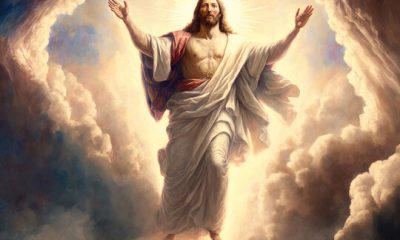
 Hot News8 months ago
Hot News8 months ago3 key evidences of Jesus’ return from the grave



